Canadian Mennonite
Volume 10, No. 06
March 20, 2006

Taking stock: Suderman’s first three months in office
Winnipeg
Jack Suderman became Mennonite Church Canada’s new general secretary at the beginning of last December. Canadian Mennonite national correspondent Leona Dueck Penner interviewed him just before the annual Leadership Assembly in Winnipeg.
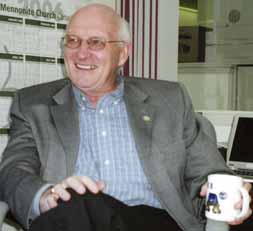 |
How does it feel three months into being MC Canada general secretary?
Suderman: Is it three months already? It feels very good so far! By now, I have a pretty clear picture of what the agenda is and how things are meant to be dealt with. No major mistakes as yet, though it is said that three years later you may notice where you took a wrong turn.
What have been the most exciting and most challenging experiences thus far?
Suderman: It’s exciting to determine what General Board meant last April when they said that the general secretary should have “higher visibility” in the constituency.
Also, working together with them on the ingredients of what that might be, not only at home in MC Canada, but ecumenically, and in international circles. Standing in solidarity with the global church excites me.
Also, we’re dealing with a good financial year. So there’s the luxury of starting this work without financial cutbacks. And at the staffing level, things are taking shape. We’re fully staffed now. New staff bring new life, energy and creativity.
As for challenges, it’s been discouraging to have several congregations leave at this time after a long process. They’ve disaffiliated themselves from area conferences and from MC Canada. I realize there are motives behind this.
As I try to understand these motives or issues, I recognize that they shouldn’t just be brushed away. These concerns are enormous, basic, legitimate, and present a big challenge—not a negative challenge.
Every generation in the church has to deal with different issues. Right now, the “area conference only membership” issue is under discussion. What should we be bringing to this perspective from MC Canada?
What about your approach to the role of our Confession of Faith on issues such as homosexuality?
Suderman: We are not a church of dogma. At best, we generate doctrinal understandings. The Spirit of God is continually active in our reading and understanding of Scripture and context. The Confession of Faith in a Mennonite Perspective—while there always has to be this—needs to be an instrument of ongoing dialogue, discernment and understanding.
Ultimately the authority is not in the answers the church gives; rather, the authority of the answer lies in the integrity of the church that gives them.
This is key. How are we the church? How do we understand the mind of God? We have to keep working at that. It is ongoing, dynamic.
What do you see as the most significant challenges facing the church? And how do you see MC Canada addressing these?
Suderman: In my view, there has been a significant loss of understanding of the ecclesial role, the mandate of the church as part of God’s agenda. A loss of understanding the very critical task that the church needs to be the church. As long as we don’t really believe that, it’s hard to be the church. So we put our eggs in other baskets: development, peace, justice, service—which are all important, assuming that there’s a corporate peoplehood undergirding this work.
Other challenges have to do with demographics: an aging population; the baby boomers bursting into retirement, which has implications as part of that downward trend in financial giving.
What is it about MC Canada that you hope will inspire and engage individuals, congregations and area conferences?
Suderman: Maybe the question is, “What is there that happens at 600 Shaftesbury that should inspire?” I believe there continues to be a very important role for a national body to do something on behalf of others—congregations and area conferences. That should excite people.
Developing an identity, vision, purpose—as a people of God at every level—that’s exciting. Defining faith and practice together as a national church—that’s exciting. Doing ministry together when it doesn’t make sense to do things alone—that’s exciting.
What does your actual role as general secretary involve?
Suderman: I’m the chief staff person of the General Board, so my role is to carry out their mandate:
• To shape and guide the vision of the denomination;
• To carefully identify priorities;
• To put in place strategic plans;
• To implement priorities;
• To be legally/financially accountable for the denomination;
• To monitor and care for, and address the spiritual condition of our churches.
It’s also about being the face of the national church in a visible way, at various levels.
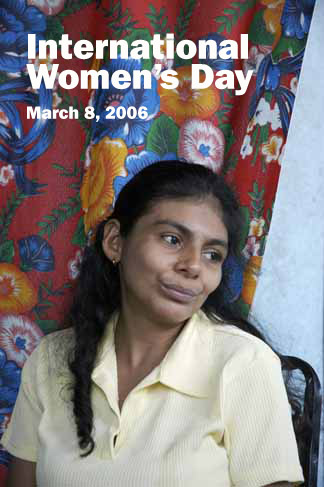 |
In honour of International Women’s Day (March 8), Canadian Mennonite is highlighting the contributions of women around the world to their families, churches and communities.
‘Praise God for the day,’ AIDS sufferer exclaims
San Salvador, El Salvador
The nearly 29,000 people living with HIV/AIDS in El Salvador may seem insignificant and hardly worth mentioning in the face of the tens of millions of people living with AIDS in Africa and Asia.
Yet it takes the story of only one person with AIDS in El Salvador to bring home the sobering impact this deadly disease has on people’s lives everywhere, from the stigma of AIDS to the loss of family members, jobs, friends and dignity.
One woman living with HIV on the outskirts of San Salvador, the capital city, is taking a courageous approach to her plight with the support of the New Dawn Association, a Mennonite Central Committee (MCC) Generations at Risk program partner based in San Salvador.
Lidia Lemus, a 30-year-old mother of four, began feeling sick eight years ago, at which time she tested positive for HIV. Her husband learned at the time he too was infected.
Lemus publicly acknowledges living with AIDS and talks openly to others about it, often speaking in churches and at a recent regional AIDS conference in San Salvador. She has been vocal when it comes to fighting for her rights to government-sponsored support services.
 |
When her husband died of AIDS in 1999, Lemus feared losing the apartment they shared because the documentation was in his name. She spent months gathering paperwork and going from office to office in an attempt to save her home. In the end, the home was transferred to her children’s names, which means they will have a place to live when they are older.
Despite saving her home for her children, Lemus made the difficult decision 18 months ago to place them all in the care of an orphanage. She realized she did not have the means or the health to offer them the life she wished for them.
“I’m missing them a lot,” she admits. “I’m going to keep visiting them while I’m still healthy, because a mom’s love doesn’t end.”
Lemus’s boldness and openness do not mean she does not face the stigma that others face. She is shunned by her family members, especially by those living in rural areas where the disease is not well known or understood. “All I wish is that my family could tell me that they love me, but they don’t do that,” she says.
The New Dawn Association has proven to be a vital source of support for Lemus. She participates in the group’s monthly support meetings, where she spends time with others who are also living with HIV/AIDS.
“We share our joys and our struggles,” she says. “We have friendship. The other women in the group are happy for me. They make me realize I have friends.”
Lemus is the first and only member of her support group who is able to take antiretroviral medication, which can prolong the lives of people with HIV. Although the medication sometimes makes her feel sick, she is thankful to have access to the drugs.
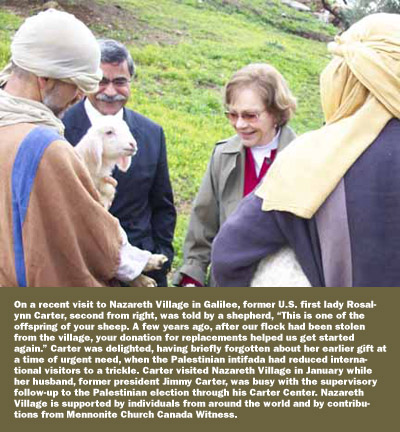 |
“I take the medication not because I like it or it makes me feel particularly good, but because it will keep me alive and let me see my children grow up,” Lemus says.
In El Salvador, grants from the Global Fund to Fight AIDS, Tuberculosis and Malaria, and other sources are allowing the government to provide free medication to Lemus and some other patients in need.
Lemus says she draws strength from the words of Psalm 91:11-12: “For he will command his angels concerning you to guard you in all your ways; they will lift you up in their hands, so that you will not strike your foot against a stone.”
Lemus says, “Every morning, I kneel by my bedside and praise God for the day.”
‘We would see Jesus’
Osler, Sask.
 |
Those four words, taken from John 12, were used easily and often throughout the MC Saskatchewan delegate sessions in Osler, as more than 200 people met in late February to worship and focus on God and his church. Flowing in and out of reports, testimonies and interesting news items, the text helped to direct the minds and hearts of all who attended.
The sessions began on Friday afternoon with a worship service led by the hosting church, Osler Mennonite. On Friday evening, conference speaker Ray Aldred began his teaching. A member of Swan River Cree Nation in Alberta, and sporting a long black ponytail, Aldred seemed an unlikely candidate to speak to the largely homogeneous crowd. But speak he did. And he had a lot to offer.
Throughout his three talks, Aldred focused his comments on earnestly leaning toward the heart issues of the Christian walk. And his ability to see through the pretense of Christian churches forced people to think. Using the idea of a story, Aldred talked about how the narrative of Jesus didn’t reach aboriginal people because the reality of what was taught wasn’t seen in their lives.
“The people stayed poor when the church said that the poor will be rich if they come to Christ,” said Aldred.
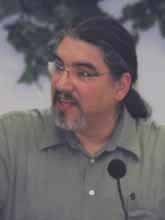 |
A story can’t be reduced to bare facts, either, he insisted. It shuts people out and the meaning of the story is destroyed. A story has layered meanings, he continued. Reading between the lines and being able to see the spiritual depth in a Bible story was a skill he learned through his First Nations heritage.
In the John 12 account, Aldred said the religious leaders didn’t want Jesus to change the status quo. Challenging the delegates on that uncomfortably true admission, Aldred claimed that the western church still thinks it is “at the centre” and that it still believes that a convert must look, act and talk like everyone else. “We have to lose the feeling of superiority,” he cautioned.
Outreach to minority groups also took a hit. Having converts from marginalized groups has been treated by Christians as more of a museum exhibit than just sharing God’s love with others, he said, giving as proof the following example. “I was speaking at a conference in B.C. once,” he said, “and afterwards, a lady came up to me and said, ‘I had no idea Indians were so intelligent.’” The comment was a painful one, he said, because it showed the extent of racism within the organized church.
A story gives identity to a group of people and it can transcend history. In an aboriginal context, Aldred said that because his great-grandfather was present at the signing of a treaty, he was too.
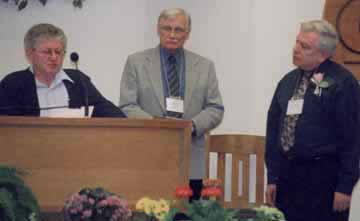 |
Following each presentation by the candid Cree pastor, delegates delved into the business sessions, having their spirits “washed in the Word and ready to focus their minds” on the business of the church, as MC Saskatchewan moderator Henry Block put it.
Five executive motions led delegates through various issues over the course of two days. The first motion spoke to the Season of Discernment and the difficult conversations that have come as a result.
Beginning with the words, “We encourage our congregations and conference to continue to grow as communities of discernment,” and generating the most response, the motion was immediately challenged by Karen Martens-Zimmerly from Grace Mennonite in Regina.
“We need modelling, not just encouragement,” she stated firmly. “We will be having lots of difficult conversations down the road.”
The need to be intentional in dealing with these issues was clear, agreed Block, because very few churches in MC Saskatchewan had worked on honing these skills.
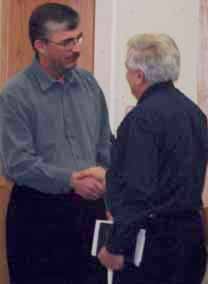 |
An amendment expressing clear-cut goals was then offered up, stating, “We encourage the executive to work with two or three congregations each year, to work at difficult conversations, partnering with congregations who have already worked at this process in order to help all of us grow.”
The amendment addressed the first part of the five-point motion. The remainder of the motion dealt with making sure any future proposals on “matters of sexuality” would be addressed prayerfully and “in the spirit of the Jerusalem council.”
Some confusion about the motion was expressed by other delegates.
“Is this [motion] about sexuality or difficult conversations?” asked Herman Wiebe, pastor of Zoar Mennonite in Langham.
In comparison, the next two motions dealt with the new vision and new structuring to help move the vision forward. Both were quickly and easily passed, as was the motion to agree to a well-thought-out action plan.
To get people thinking, and to save time, roundtable discussions were planned over coffee and cookies and around the separate topics of discernment and structuring. Delegates met to process experiences of discernment in their own churches and then to decipher what was wrong with MC Saskatchewan’s structure and what could be improved.
Against the backdrop of moving forward with a new vision and new hope for the future, was also the painful reality that delegates must acknow-
ledge people leaving, congregations separating and nursing homes closing.
Conference minister Ken Bechtel ended his three-year term with MC Saskatchewan to become a co-pastor with Anita Janz at Nutana Park Mennonite in Saskatoon. A commissioning service was held for him at the end of the conference.
Rosthern Junior College is losing long-time principal Erwin Tiessen. After almost 18 years at the MC Saskatchewan- and MC Alberta-supported school, Tiessen is retiring. Many families in Saskatchewan and Alberta have formed deeply held friendships with the respected educator, as he has worked to move the institution forward and improve the educational opportunities for their children.
Equally sad were statements read by representatives of two churches—Cornerstone Mennonite in Saskatoon and Neuanlage Grace Mennonite near Hague—leaving the conference, while a third, Bethany Mennonite in Watrous, is closing down.
Of the 10 members who are left at Bethany, who had been served for many years by visiting ministers, most will go to the Mennonite Brethren church in town, delegates were told.
Pastor Henry Janzen of Neuanlage Grace Mennonite looked subdued as he read a short statement about their decision.
Bechtel then led the assembly in a Litany of Separation, saying it was important to acknowledge the grieving process. “We will miss [youth pastor] Brent Klassen at our monthly meetings,” said Anna Rehan, conference youth minister.
Ending the relationship with the Herbert Nursing home was decided last June, but the delegate body had not met since then. During the business sessions, an executive motion asked for acceptance to use some funds from the sale of the building to balance the conference budget.
Congregations asked to discern
conference Identity and Vision Statement
Abbotsford, B.C.
 |
God’s work among Mennonite Church British Columbia is not finished, participants at this year’s annual delegate sessions were reminded. The theme for the Feb. 24-25 gathering, held at Eben-Ezer Mennonite Church, was “Renovations in progress,” based on I Peter.
A visual depiction of the theme involved building blocks that various people assembled cooperatively to make an archway at the front of the worship and meeting areas.
The tone and format of the meetings exemplified how these annual business sessions have progressed over the years. Instead of spending the day sitting in church pews hearing committee reports and budgets, delegates gathered around tables to discuss issues and get acquainted with members of different congregations.
A main focus of the Saturday morning session was the report presented by the Steering Committee to review and renew the identity and vision of Mennonite Church B.C. At roundtable discussions, delegates were asked to consider, “What can I affirm in the Identity and Vision Statement, and what would enrich this statement?”
Following discussion and feedback from the various delegate tables, the following motion from the executive came to the floor: “Be it resolved that we receive the report of the Steering Committee and encourage their work to continue, with the next step being congregational discernment.”
The motion was passed with only a few opposing.
Steering Committee chair Walter Bergen asked people to continue discussing the statement in their own churches. “I sense God’s Spirit leading us for growth and change,” he said.
The delegates also voted on a new partnership agreement with Canadian Mennonite. The motion presented by the MC B.C. Executive was, “That Mennonite Church British Columbia approves the Canadian Mennonite Partnership Agreement in principle and that MC B.C. include the Canadian Mennonite as a budget line item based on those churches receiving the paper and that churches increase their giving to MC B.C. to cover their portion of the subscription. For this year that would be $11 per subscription.” It was acknowledged that not all congregations use the English language nor do all find the periodical speaks to them. There was no discussion from the floor on the motion and it was passed almost unanimously.
Keynote speaker J. Nelson Kraybill, president of Associated Mennonite Biblical Seminary in Elkhart, Ind., addressed the assembly several times throughout the weekend and based much of his talk on stories of Paul and the early church. When a show of hands at the Friday evening worship service indicated a number of people present were born in other countries, Kraybill reminded everyone that Christians are “resident aliens” in a postmodern world and that the Mennonite immigration story illustrates this. “Our society as a whole is experiencing a new kind of rootlessness,” he said.
Kraybill’s address on Saturday morning looked at how Christians fit—or don’t fit—into the world around them, and how being part of the family of God gives Christians a new identity. The early church, like the church today, had many factions, but he said the questions about any church should be, “Do you base your teaching on Jesus Christ? Do you take Scriptures as authority for your lives and practice, even though we may differ? Do you base your teaching of discipleship on Scripture? Are you active in mission? Do you draw people to faith in Jesus Christ?” He added, “My role in the church is to point others to the foundation and make sure I’m grounded there.”
At the Saturday afternoon sessions a number of farewells took place. In response to Mennonite Church of Vernon’s decision to leave MC B.C., conference minister Henry Kliewer gave affirmation to the congregation while acknowledging the pain this decision involves. “Separation can create new opportunities,” he said. “If it can create new life and new ministry, we want to affirm that.”
Vernon pastor Bob Cowan also said his church has been grateful for many MC B.C. connections and involvements over the years. “We want to part on good terms and part with blessing. We pray that God will continue to be with us,” he said.
A motion regarding the transfer of title and property to the Mennonite Church of Vernon was passed, pending final legal wording.
MC B.C. also said a formal farewell to Rudy Kehler, director of Camp Squeah for 18 years, who is leaving to pursue a home-based business.
Concluding the afternoon, outgoing MC B.C. moderator Doug Epp was affirmed for his leadership, and incoming moderator Gerd Bartel and new and continuing committee members were commissioned for their tasks in the year ahead.
Leaders urged to use their imagination
Rosetown, Man.
Mennonite Church Manitoba’s annual leadership seminar began with an inspiring meditation given by Peter Zacharias, lead pastor of Blumenort Mennonite Church. More than 85 pastors, deacons and church leaders listened as Zacharias challenged them to reclaim the mystery of imagination. Speaking from Ephesians 3:14-21, Zacharias suggested that it is often within “a dark night of the soul” that God shows people who they really are. In reclaiming the mystery of imagination, the church can again grab hold of how wide, long, high and deep is the love of Christ, he said.
Building on the meditation, keynote speaker Jack Suderman, general secretary of MC Canada, helped participants imagine the storms and trials that keep leaders from a continuous focus on the task of leadership. Drawing upon his extensive experience within the Canadian church and in Latin America, Suderman stressed the need for imagination in leadership. Church leaders were challenged that their imagination has become colonized in Canada, where leaders are shaped by their understanding of economics, security, and personal and social welfare. For this reason, Suderman suggested that awakening their imagination is one of the most critical tasks facing leadership within the Mennonite Church in the Canadian context.
Suderman then took participants on a walk through Ephesians to explore a number of key themes:
• The mission of God;
• The vision, purpose and function of the church;
• The projected outcomes of the church’s presence; and,
• The strategies to be employed in reclaiming the mystery of imagination.
After lunch, Suderman shared extensively from his recent experience with the leadership of the Colombian church. Speaking of the need for leaders who have reclaimed the mystery of imagination, Suderman shared a Latin American proverb, “It is better to make one step with a thousand people than to make one thousand steps on your own.”
His second session focused on his recent paper, “Missional ecclesiology and leadership: Toward an understanding of the Emerging Church.”
Recognizing that leaders can often be distracted from the task of leading by the many storms and trials that obscure the way ahead, the seminar was a day of significant challenge for the conference and congregational leadership. It was also a day of hope and encouragement, as the church and its leaders were again invited to reclaim the mystery of God’s imagination for his purposes in the world for today and into the future.
American CPT worker confirmed dead
Baghdad, Iraq
 |
The body of Christian Peacemaker Teams (CPT) member Tom Fox was found in an affluent section of Baghdad on March 9. He had been shot, and there were indications he had been beaten before his execution.
In a statement to the media, CPT said it mourned his loss. “Tom Fox…combined a lightness of spirit, a firm opposition to all oppression and the recognition of God in everyone,” it said. Co-directors Doug Pritchard and Carol Rose appealed to people to “set aside inclinations to vilify or demonize others, no matter what they have done.”
Fox’s death followed by three days the release of a video showing the other three CPT members who were kidnapped Nov. 26 in Baghdad as alive and apparently well.
The men—Canadians Jim Loney and Harmeet Singh Sooden and Briton Norm Kember—entreated their governments and other Middle Eastern countries to work for their release, according to the al Jazeera network, which aired the tape dated Feb. 28.
CPT, an international violence reduction organization, called for events to mark the 100th day of captivity for the peace workers on March 4. Vigils were organized around the world, CPT said in a statement, that also remembered “the families of 14,600 Iraqis currently detained illegally by the multi-national forces in Iraq who likewise await the release of their loved ones.”
Following the release of the video, CPT representatives from its headquarters in Chicago and Toronto, said they were glad to see Kember, 74, Loney, 41, and Sooden, 32, alive.
“We do not know what to make of Tom Fox’s absence from this video,” they said at the time. “However, we do know what motivated Tom and his colleagues to go to Iraq. Tom wrote on the day before he was taken, ‘We are here to take part in the creation of the Peaceable Realm of God…. How we take part in the creation of this realm is to love God with all our heart, our mind and our strength, and to love our neighbours and enemies as we love God and ourselves.’”
The Swords of Righteousness Brigade, a previously unknown group, has claimed responsibility for holding the men, and has demanded the release of all prisoners in U.S.- and Iraqi-run detention centres in two previous tapes. No deadlines were ever given, but failure to release the prisoners would result in the deaths of the CPT workers, the kidnappers said.
CPT has had a presence in Iraq since 2002, working with local partners to document detainee abuse and encourage the formation of a Muslim peacemakers group.
At the same time as al Jazeera aired the tape of the three CPT hostages, a tape by members of Loney’s family pleading for his release was also shown.
Peacemakers explain what motivates them
Winnipeg
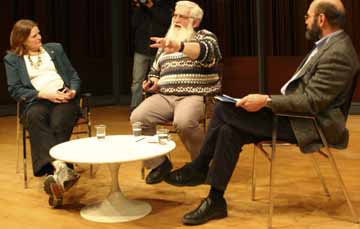 |
When Karen Ridd hears people in the media ask whether Christian Peacemaker Teams (CPT) should have sent workers to a dangerous country like Iraq, she gets angry.
“I want to shake a non-violent fist at the radio,” she told people at a Feb. 23 forum in Winnipeg organized by the Canadian Mennonite University (CMU) Institute for Community Peacebuilding. “Why is it okay for Iraqis to live in a dangerous country, but not okay for North Americans to go there to try to help? And why is this question only being asked of CPT, and not when a businessman is kidnapped? There isn’t the same critique.”
Ridd, a long-time Winnipeg peace activist who was jailed for her activities with Peace Brigades International in El Salvador in 1989, was one of two speakers at the forum. She was joined by Gene Stoltzfus, a founder and the first director of CPT.
Why are we here?The reflection was written by American CPT worker Tom Fox the day before he was abducted last November. He was found dead on March 9 in Baghdad. Ed. The Christian Peacemaker Teams (CPT) Iraq team went through a discernment process, seeking to identify aspects of our work here in Iraq that are compelling enough to continue the project and comparing them with the costs (financial, psychological, physical). It was a healthy exercise, but it led me to a somewhat larger question: Why are we here? If I understand the message of God, his response to that question is that we are to take part in the creation of the Peaceable Realm of God. Again, if I understand the message of God, how we take part in the creation of this realm is to love God with all our heart, our mind and our strength, and to love our neighbours and enemies as we love God and ourselves. In its essential form, different aspects of love bring about the creation of the realm. The word in the Greek Bible that is translated as “love” is the word “agape.” This word is best expressed as a profound respect for all human beings simply for the fact that they are all God’s children. I would state that idea in a somewhat different way: “Never thinking or doing anything that would dehumanize one of my fellow human beings.” As I survey the landscape here in Iraq, dehumanization seems to be the operative means of relating to each other. U.S. forces in their quest to hunt down and kill “terrorists” are, as a result of this dehumanizing word, not only killing “terrorists” but also killing innocent Iraqis—men, women and children in the various towns and villages. It seems as if the first step down the road to violence is taken when I dehumanize a person. That violence might stay within my thoughts or find its way into the outer world and become expressed verbally, psychologically, structurally or physically. As soon as I rob a fellow human being of his or her humanity by sticking a dehumanizing label on them, I begin the process that can have, as an end result, torture, injury and death. Why are we here? We are here to root out all aspects of dehumanization that exist within us. We are here to stand with those being dehumanized by oppressors and stand firm against that dehumanization. We are here to stop people, including ourselves, from dehumanizing any of God’s children, no matter how much they dehumanize their own souls. |
For both Ridd and Stoltzfus, being willing to make the same sacrifices as those who are willing to go to war is key to the success of peacemaking. Said Ridd, “Unless we are prepared to go the distance, we won’t be able to have a fair conversation” with those on the other side of the issue.
Stoltzfus recalled how, as a conscientious objector in Vietnam in the 1960s, his perspective was changed by seeing the dead bodies of soldiers killed in the fighting. Like those soldiers who were willing to put their lives on the line, going to dangerous places around the world “is our purpose, why we were called into being—not to run away,” he said.
The two also agreed that a determining factor in deciding whether or not to stay in a country was if the presence of foreigners made life more dangerous for local people. Otherwise, their presence “shines the light,” as Ridd put it, and is a way of helping people in these countries to feel “connected to the larger world.”
Much of our work isn’t very successful,” Stoltzfus said of CPT’s work on behalf of Iraqi detainees. But it is important for CPT to be there, he said, adding, “If you aren’t at the plate, you can’t score.”